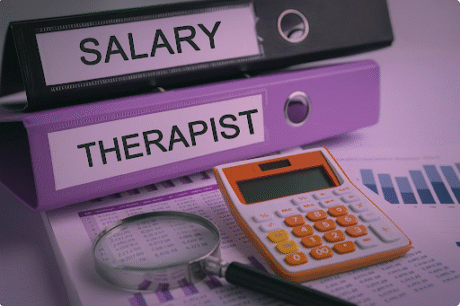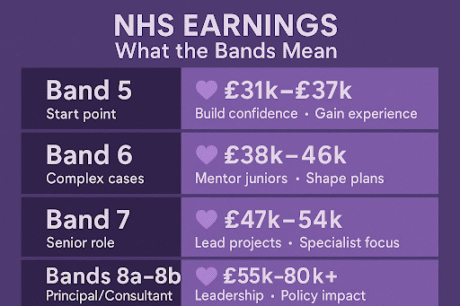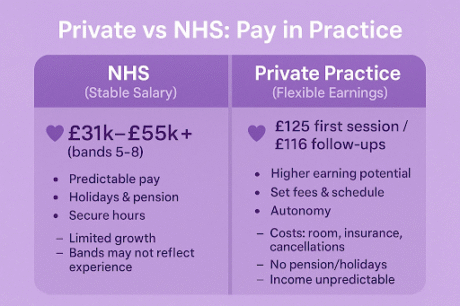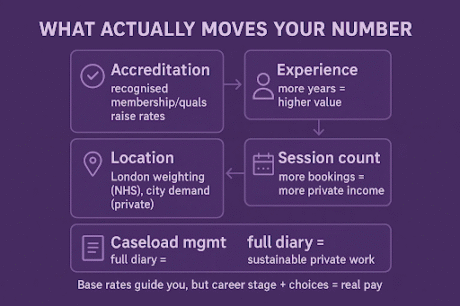No products in the basket.
How much does a therapist earn? In the UK, the answer depends on whether you work in the NHS or in private practice. NHS salaries follow fixed pay bands, while private earnings vary based on clients and costs.NHS Therapists: Salaries range from £28,000 to £35,000 annually, depending on experience and role. Average annual earnings of Private Practice Therapists are approximately £38,094, with top earners reaching up to £108,170.

These ranges cover most roles in counselling, psychotherapy, and clinical psychology. You may also receive extra pay if you work in London or high-cost areas.
In this article, we explore therapist pay in detail. You’ll discover how much therapists earn in 2025, the difference between NHS salaries and private practice earnings, how location and experience affect pay, and what factors influence growth opportunities. By the end, you’ll have a clear picture of therapist earnings and what to expect if you are considering this career.
Who We Mean by “Therapist”
When we say “therapist,” we mean anyone who helps people with their mental health, emotions, or well-being. This includes counsellors, psychotherapists, CBT therapists, and high-intensity therapists like PWPs (Psychological Wellbeing Practitioners).
A therapist is a trained professional who listens, guides, and supports people to manage stress, anxiety, depression, or other emotional challenges. They help clients understand their feelings, find solutions, and make positive changes in their lives.
Therapists work in many settings — schools, hospitals, clinics, or private practice — and their pay depends on their role, experience, and where they work.
How Much Does a Therapist Earn in The NHS?
- Band 5 therapists earn between £31,049 and £37,796 a year. This is where most newly qualified therapists begin. At this stage, you focus on building confidence and gaining hands-on experience.
- Band 6 therapists earn £38,682 to £46,580 a year. Here, you handle more complex cases. You may also start to mentor junior colleagues and shape treatment plans.
- Band 7 therapists earn £47,810 to £54,710 a year. These are senior posts. At this level, you often manage a team, lead projects, or take on a specialist focus.
- Bands 8a and 8b go even higher, starting above £55,000. These jobs are for principal or consultant therapists. You take on advanced leadership, oversee services, and influence policies. At the top end, salaries can pass £80,000.

How Much Does Therapists Make in Private Practice?
Most private therapy sessions across the UK cost between £50 and £100 per session. Fees vary depending on the therapist’s experience and location. In London and other high-cost areas, sessions often range from £70 to £150. Specialists in niche fields, like CBT or trauma therapy, may charge higher rates.
Initial consultations with psychologists or highly trained specialists can cost around £125. Follow-up sessions are usually slightly cheaper, often between £80 and £110. Some therapists offer sliding scales, online sessions, or block booking discounts to make therapy more affordable. Always check if fees include VAT, assessments, or extra materials.
Private vs NHS: Which Pays More in Practice?

NHS (Stable Salary)
- Advantages:
- Regular, predictable pay (£31k–£55k+ depending on band)
- Paid holidays and pension benefits
- Job security and steady hours
- Disadvantages:
- Limited earning growth compared to private practice
- Pay bands may not fully reflect experience
Private Practice (Flexible Earnings)
- Advantages:
- Potential to earn more if you see many clients
- You can set higher fees for specialist services (e.g., £125 first session, £116 follow-ups)
- Flexible schedule and autonomy over your work
- Disadvantages:
- Extra costs like room hire, insurance, and cancellations
- Income can be unpredictable
- No guaranteed benefits like pensions or paid holidays
Real-World NHS Adverts You’ll See Today
If you are looking at NHS therapy jobs in 2025, you’ll notice that pay depends on the role, experience, and band level. For example, higher-level roles like CBT therapists or High-Intensity therapists are usually advertised in Band 7, which pays between £47,810 and £54,710 per year. The exact salary depends on how much experience you have and the specific responsibilities of the role. These jobs often involve working with complex cases and delivering specialised therapy programs.
For those just starting out, or in PWP-type positions, the adverts often list Band 5 or 6 roles. These pay ranges are £31,049 to £46,580, depending on your experience and location. Entry-level roles are ideal for gaining experience and building your skills in therapy delivery, patient support, and assessment.
Many NHS adverts also mention additional benefits. For example, you may get high-cost area supplements if you work in London or other expensive areas. Some roles include training opportunities, career development programs, and even flexible working options. Seeing these adverts gives a realistic view of NHS salaries and helps you plan your career path, whether you aim to move up the bands or eventually explore private practice.
London & Hotspots (Why Public & Private Pay More Here)
If you work in London or other high-cost areas, both NHS and private therapy pay more than elsewhere. For NHS roles, there is a High Cost Area Supplement that increases your base salary, helping you cover the higher living costs in inner or outer London. This means a Band 7 therapist in London can earn noticeably more than the same role elsewhere.
In private practice, fees in central London are often much higher, typically ranging from £70 to £173+ per session. This higher rate reflects both the cost of living and the demand for therapy in the city. However, private therapists also need to cover expenses like room hire, cancellations, and professional insurance. Even so, many therapists find London a place where they can earn significantly more while gaining experience with diverse clients.
What Actually Moves Your Number (Both Sectors)

Several factors shape how much you take home as a therapist.
- Accreditation – recognised membership or qualifications often let you charge more.
- Experience – the longer you practise, the higher your value in either sector.
- Location – London weighting boosts NHS pay, while city demand lifts private fees.
- Session count – more booked sessions mean more earnings in private practice.
- Caseload management – filling your diary consistently makes private work sustainable.
So, while base rates set a guide, your career stage and choices strongly shape final pay.
How to Read an NHS Job Ad
If you want to know how much does a therapist earn, NHS job adverts are a good starting point. They show pay, hours, and location at a glance.
Start by looking for the band: 5, 6, 7, or higher. This tells you the basic salary range. Next, check the location. Jobs in London or “High Cost Areas” usually pay more.
Also note the hours per week and the job title. For example, a High-Intensity (HI) Therapist is often Band 7, which pays £47,810–£54,710. Entry-level roles, like Psychological Wellbeing Practitioners (PWPs), are Band 5 or 6, earning £31,049–£46,580.
By mapping the band and location to NHS pay bands, you can quickly estimate a role’s salary. This helps you decide whether to apply and plan your career.
How to Read a Private Fee Page
When you look at a private fee page, start by checking the session rate. Most therapists list a standard session cost and a higher price for an initial consultation. The first meeting often takes longer, so it costs more. Then check where the therapist works. In London or other expensive areas, fees rise to reflect living costs. In most UK regions, you can expect fees between £50 and £100. However, in central London, it is common to see rates between £70 and £150 or even more.
Qualifications also play a big part in setting fees. A newly qualified counsellor may charge on the lower end, while a chartered psychologist or specialist therapist often charges higher rates. For example, some psychologists set initial consultations around £125, while follow-ups cost a little less, often about £110. Beyond this, therapy type also matters. Niche services like couples counselling, trauma-focused therapy, or child therapy can bring higher fees. Online therapy may be cheaper, but not always, as some therapists match in-person prices.
Finally, look out for hidden costs or discounts. Some therapists charge for missed sessions, while others offer reduced rates for block bookings. A few also provide sliding scales for clients on lower incomes. Reading carefully helps you know what you will pay before you book.
Ethical Pricing
Many therapists think carefully about ethics when they set fees. They aim to keep therapy open to as many people as possible.
Because of this, some therapists use a sliding scale. This means clients with lower incomes pay less, often between £10 and £40. Some charity-based sessions sit in the same range. These sessions allow people who might not afford standard therapy to still receive support.
In the Midlands and northern regions, fees often stay lower. Clients may pay between £45 and £70 for each session. In London and the South East, prices rise higher. Sessions often cost between £70 and £150, depending on location and therapist experience.
Therapists also adjust fees for different reasons. Some lower costs for students, key workers, or people in financial hardship. Because of these factors, therapy costs vary widely across the UK. So, it helps to always check local options before you book.
Begin Your Psychotherapy Training Today
Ready to build a rewarding career in mental health? Our Introduction to Psychotherapy Training course gives you the tools, skills, and confidence to start your journey. Enrol now and take the first step towards helping others live healthier, happier lives.
Final Thoughts
Therapist pay in the UK varies widely depending on whether you work in the NHS or in private practice. NHS roles offer stability, predictable progression through pay bands, pensions, and paid leave. Private practice, by contrast, offers the potential to earn more, but income depends on location, client numbers, and managing business costs.
Location is also a big factor. London and other high-cost areas bring higher NHS supplements and higher private fees, but also higher expenses. Experience, specialist training, and accreditation can all move your income upward, whichever sector you choose.
For anyone considering this career, the real question isn’t just “How much does a therapist earn?” but “Which path fits my lifestyle and goals?” If you value security and benefits, the NHS may be the better fit. If you want flexibility and higher earning potential, private practice might suit you more.
Either way, therapy is a profession that balances financial reward with meaningful impact. Beyond the numbers, the role offers the chance to help people change their lives — and that can be just as valuable as the pay.
FAQs
- How much do private therapy sessions cost in the UK?
Most sessions cost between £50 and £100. In London, prices often range from £70 to £150. - Do therapists offer cheaper options?
Yes. Some use a sliding scale, with sessions from £10 to £40. Charities may also provide low-cost therapy. - Why do London sessions cost more?
Living and office costs are higher in London. Therapists often set fees at the top end of the range. - Do first sessions cost more?
Often, yes. First consultations with specialists may cost around £125. Follow-up sessions are usually lower. - Can I get online therapy for less?
Sometimes. Online sessions may cost less than face-to-face, especially outside London. - Do all therapists offer discounts?
Not all. But some reduce fees for students, key workers, or people with financial hardship.




